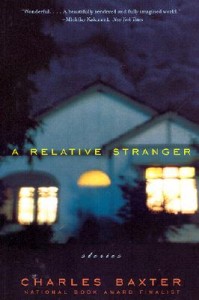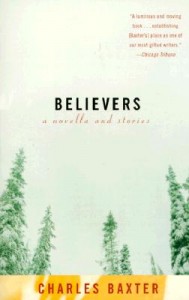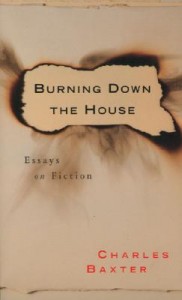 A gryphon is a magical creature—half eagle, half lion. It is also the title of Charles Baxter’s most recent book, a collection of new and selected stories, published this month by Pantheon.
A gryphon is a magical creature—half eagle, half lion. It is also the title of Charles Baxter’s most recent book, a collection of new and selected stories, published this month by Pantheon.
It’s a well-chosen title. Partly because “Gryphon” is one of Baxter’s most anthologized and lauded stories, partly because it’s a feat of magic for any writer to reach the milestone of having a book of collected stories, and partly—as I learned from Charlie on his recent return to Ann Arbor as part of the Zell Visiting Writers Series at the University of Michigan—because the story “Gryphon” was a salvage job from one of his first, unpublished novels. And so all the stories that have come since can, in a sense, trace their lineage back to that primary work.
As a young writer, it gives me wonderful hope to know that a career as accomplished as Baxter’s originated from the wreck of such early trials and attempts at fiction. It is also perhaps here that I should note that as an even younger writer, Charlie was my teacher. And now I am happy to call him a friend. So what follows can’t be called a review. Rather, let us call it an appreciation. An appreciation for the author and his influence. Not just on me or on the many writers who have apprenticed under his tutelage, but also on the craft of fiction as a whole.
I was a fifteen-year-old high school student when I first met Charlie. This was more than twenty years ago, back when I was attending the Interlochen Arts Academy, a private boarding school for the arts. His reading that evening took place in our chapel. Though since the school had no religious affiliation, we used it for piano recitals and string quartet performances and poetry readings. Imagine if Frank Lloyd Wright had been commissioned to build a worship space for followers of Hemingway’s nature religion—it had the lines and angles of the Arts & Crafts movement, but was less decorative; the ceilings soared, but not ostentatiously so; there were pews, but they were padded with burnt-orange cushions the color of marigolds.
 I was sitting in the middle of the back row and Charlie was reading from “Snow.” I can’t remember what time of year it was, so I can’t say if the landscape outside the window matched the setting of his story as it does outside my office window today. But I recognized the frozen lake (our campus sat on the edge of one for nearly six months out of the year) and the longing (did I mention I was a fifteen-year-old boy at the time?), as well as the acts of daring that spring from the desire to impress girls (again, fifteen-year-old boy).
I was sitting in the middle of the back row and Charlie was reading from “Snow.” I can’t remember what time of year it was, so I can’t say if the landscape outside the window matched the setting of his story as it does outside my office window today. But I recognized the frozen lake (our campus sat on the edge of one for nearly six months out of the year) and the longing (did I mention I was a fifteen-year-old boy at the time?), as well as the acts of daring that spring from the desire to impress girls (again, fifteen-year-old boy).
Or, at least, this is what I imagine I must have felt. Because, in fact, my most powerful memory of that reading was the experience of leaving my body, of floating up to the vaulting ceiling, beyond the pine walls and the wood beams. It wasn’t even until the end of the story that I realized it had happened—when the applause began and I was summoned back to myself. And at that moment I had one thought: I want to be able to do that. To summon that magic. So I decided then and there that I would go to school wherever this man was teaching, with the hope of studying the art with him.
Lucky for me—and, for my parents, since it meant paying in-state tuition—Charlie was still teaching at the University of Michigan, and so I headed there a few years later. Luckier still, Charlie would agree to serve as my thesis advisor, patiently watching over my shoulder as I wrote my first clumsy stories—about a man robbed at gunpoint in a laundromat (which had not happened to me); about a woman who snorts coke and plays cards with her neighbors (again, not me); about a boy who experiences the death of one of his family members each October and who approaches the coming fall, understandably, with some trepidation (the closest I could come to truth in fiction then). It is no surprise that the last of these, the only one that tapped into something I actually understood at an emotional level, eventually became the first story that I would publish. In it, for the fist time, I was unafraid of sentiment. I actually cared about the characters. Charlie taught me that. Few authors treat their characters with such compassion. This is not to say that those individuals don’t get themselves into trouble. In fact, that was Charlie’s first rule: You must get your characters into interesting trouble. But you were never to treat them like pawns, or to scorch them like ants under a magnifying glass.
 But few things were as magical to me as a reader, or more influential to my development as a writer, than what Charlie could do with voice. In 1997, the spring of my senior year of college, his collection Believers was published. And if you weren’t one already, I’ll risk both cliché and hyperbole by saying that you would have been a believer in Charlie’s fiction after finishing this book. Reading the title novella, I felt something akin to that out-of-body experience I’d had seven years earlier. Though this time it wasn’t the evocation of place or the immersion in character that was so magical, but the effortless shift that took place between the teller of the story and his father, Franz Pielke. One moment the story belongs to the younger man, and in the next instant it belongs to the other. The point of view transitions so seamlessly that it wasn’t until the first voice returned many pages later that I realized the transfer had even taken place. Going back, you might pinpoint these lines from the son as the membrane that separates them: “But I see that, once again, I am anticipating myself. It is a habit of a man who has thought too much about the story he is telling.” Yet it’s only in hindsight that one realizes the gulf of time and space that you’ve been ferried across.
But few things were as magical to me as a reader, or more influential to my development as a writer, than what Charlie could do with voice. In 1997, the spring of my senior year of college, his collection Believers was published. And if you weren’t one already, I’ll risk both cliché and hyperbole by saying that you would have been a believer in Charlie’s fiction after finishing this book. Reading the title novella, I felt something akin to that out-of-body experience I’d had seven years earlier. Though this time it wasn’t the evocation of place or the immersion in character that was so magical, but the effortless shift that took place between the teller of the story and his father, Franz Pielke. One moment the story belongs to the younger man, and in the next instant it belongs to the other. The point of view transitions so seamlessly that it wasn’t until the first voice returned many pages later that I realized the transfer had even taken place. Going back, you might pinpoint these lines from the son as the membrane that separates them: “But I see that, once again, I am anticipating myself. It is a habit of a man who has thought too much about the story he is telling.” Yet it’s only in hindsight that one realizes the gulf of time and space that you’ve been ferried across.
This nod to the storytelling qualities of these stories—an awarenesss that they are being told, that there is a reader—was another element I tried to take away as an apprentice. Specifically, the generosity that this act implies. Because it’s a humble position to take as a writer: that the reader matters as much as you do, that you’re partners in this enterprise, that you’re working collaboratively to evoke these worlds, to simultaneously—both of you—create the fictional universe from shared belief and trust.
 When I first heard Charlie read, I’d mistakenly attributed his skill to showmanship—the author as literary hypnotist and his reader as willing audience volunteer. Yet I realized as I was re-reading some of the older stories in this new collection for the first time in, often, a decade, that what had actually gone on was a different kind of magic: by treating his reader with the same level of respect and care that he has for the lives of his characters, Baxter actually allows us to participate in the process. He welcomes us to suspend our disbelief. And because he trusts us, we trust him.
When I first heard Charlie read, I’d mistakenly attributed his skill to showmanship—the author as literary hypnotist and his reader as willing audience volunteer. Yet I realized as I was re-reading some of the older stories in this new collection for the first time in, often, a decade, that what had actually gone on was a different kind of magic: by treating his reader with the same level of respect and care that he has for the lives of his characters, Baxter actually allows us to participate in the process. He welcomes us to suspend our disbelief. And because he trusts us, we trust him.
We also trust him because there are no tricks or no gimmicks in these stories. No sudden reversals or withholding of information to create dramatic tension. No answers when there aren’t any, and plenty of sentiment when it’s called for. No hipster sarcasm (thanks be above!) or the misunderstood use of irony.
This is not to say that Charlie avoids satire in his work. In fact, one of his newest stories in this collection, entitled “The Winner,” which was published by Tin House last fall, employs it to great effect. The story is narrated by Krumholtz, a freelance journalist, who is hired by Success magazine to interview the magazine’s upcoming profile subject, James Mallard, an extravagantly wealthy businessman. Baxter writes:
Just as Playboy always had a foldout, Success had a Winner…These feature articles, celebratory but not effusive or craven, would have as their subtext an understanding of the complexity of achieving great wealth. Seasonings of wit and irony were acceptable if dropped knowingly here and there throughout the article, but even a hint of skepticism in the face of affluence would be ruthlessly blue-penciled. “Vogue does not mock fashion and we do not mock riches,” Krumholtz’s editor had told him. “The amassing of a large fortune is to the readers of our magazine a sweetly solemn thought.”
Likewise, Baxter understands dramatic irony and how to correctly employ it—not as an “ironic stance,” as Ellen Bryant Voigt refers to it in her wonderful essay “Double Talk and Double Vision,” but to reveal what his characters sometimes can’t see themselves. It’s here, rendered exquisitely in earlier stories like “Harmony of the World,” as well as in the more recent ones like “Poor Devil” and “Mr. Scary.”
“Poor Devil” is one of the most moving stories in the collection, as it shows not only Charlie’s exquisite language and his ability to render dialogue saturated with subtext, but also the magic of being able to reveal what it’s like to be human. On the surface, it is the simplest of plots: a divorced couple has returned to the home they once shared in order to clean it for the new owners. On why they’ve decided to undertake this task, the narrator, who is the ex-husband, explains:
We both like the young couple who have bought the house—smiling, just-out-of-school types with one toddler and another child on the way. We want to give them a decent chance. During our eight years together, Emily and I never had any kids ourselves—luckily, or: unluckily, who can say.
Like Hemingway’s famous six-word story, “For sale: baby shoes, never worn,” these lines of Baxter’s resonate with the same grief. Grief precisely because of the hope entwined with the stalwart spirit of the speaker. To call it Midwestern resolve would be dismissive and wrong. But it is akin to the person who can only move ahead by putting the infant’s shoes up for sale rather than, say, turning them into a shrine of loss.
“Resiliency,” perhaps, is more accurate. For this is where the beauty comes. From the “almosts,” from the “might-have-beens” that we keep telling ourselves are coming. Or will come again some day.
Here, because it is too beautiful not to end with, is the conclusion of “Poor Devil.” If I were teaching this to my own students here at the University of Michigan, where I now work myself, I would say to them, “Listen to how this sings! Listen to the music of the line!” I would read it aloud so that the language would lift them out of their seats.
And with that I will close by saying a simple “Thank You,” so that I might let the master have the last word:
When we get to the house, my ex-wife is about to unlock her car and drive away, but she’s left her purse and wallet in the kitchen. So, together, the two of us go in the front door, and we step into the foyer and the living room. They’re completely dark—it’s night by now—and only the streetlight is spraying a little bit of illumination into the room, barely enough to see by.
“Close your eyes,” Emily says. “Could you find your way around in this place with your eyes closed? I bet you could.”
“Of course,” I say.
So I close my eyes and hold my arms out in the dark, and I walk all around the room where the lamps and tables and chairs were, where Em and I once lived, and I go into the dining room, still with my eyes closed, and I walk into the kitchen, past the counter and the dishwasher and then back out, taking my steps one at a time through these spaces I’ve come to know so intimately. It’s just as well that my eyes are closed as I’m walking through this dark house where Emily and I tried to stage our marriage, because I have this image of Santa jogging—no, springing—away from me, and I probably have a grim look.
It’s right about then that I’m backing the living room and I bump against Emily, whose arms also have been out, in this game we’re playing. In the story that I don’t tell, we excuse ourselves, but then, very slowly and tenderly, we are inspired by each other at last, and we take each other in our arms, and all the bad times fall away, and we kiss, and we mutter our apologies, our long-standing whispered complicated remorse, and perhaps we sink to the floor, and we make love together in the dark empty living room, on the floor, understanding that maybe it will not be the last time, after all. And as we make love, Emily makes her utterly familiar trembling cry when she comes.
That’s the story that I don’t tell, because it doesn’t happen, and couldn’t, and would not, because I am unforgiveable, and so is she. Two poor devils: what we don’t feel is remorse, the word on that postcard. We bump into each other, two blind staggerers, two solitudes, and then, yes, we apologize. And that’s when Emily goes into the kitchen, her eyes open, but still in the dark house that she knows, as they say, by heart, and she picks up her purse from where she has left it, and she comes out, sailing past me, and she maybe half turns in the dark, and blows me a kiss, but probably she doesn’t.
She closes the front door behind her, absentmindedly locking it, locking me into the house. And it’s then, and only then, that I speak up. “Good-bye, honey,” I say.
Further Links and Resources:
Read Ellen Bryant Voigt’s essay on the mis-use of irony in her 2009 Hopwood speech, published in essay form in The Michigan Quarterly Review.





